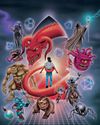Lessons in journalism—and business—from editing the New York Times during the great digital disruption.

WHEN I TOOK the reins of the New York Times in 2011, it was during a period of convulsive change and financial struggle, when the pace of the great digital disruption had intensified after the introduction of the iPhone and Facebook’s News Feed. The decade that followed, which culminated in Donald Trump’s election, transformed everything about how the news was reported and delivered. On their smartphones, people expected news to be instantaneous, even if the stories were erroneous. The old business model—advertising and circulation—was shattered by the new mantra that news had to be free. News was global, and could be manipulated by foreign powers, as the world learned in the 2016 election.
As executive editor of the Times, I had the best ringside seat to the digital transformation of what I still consider to be the one indispensable news organization in the world. People desperately need reliable information for democracy to survive, but there seemed to be no reliable business model to sustain it. Legacy newspapers like the Times and the Washington Post were struggling to become digital first and to find new revenue. That meant hammering holes in the wall that long separated news and business. Meanwhile, new players like Buzz Feed and Vice were building huge audiences on social platforms like Facebook and YouTube. With valuations in the billions, they looked to be the digital winners. During my tenure, change was the only certainty.
The conclusion of a much-discussed Innovation Report written by Arthur Gregg Sulzberger, the Times’ current publisher, was that the Times wasn’t changing fast enough. At almost the same moment in 2014, I was fired and lost my place as an eyewitness.
Esta historia es de la edición January 21, 2019 de New York magazine.
Comience su prueba gratuita de Magzter GOLD de 7 días para acceder a miles de historias premium seleccionadas y a más de 9,000 revistas y periódicos.
Ya eres suscriptor ? Conectar
Esta historia es de la edición January 21, 2019 de New York magazine.
Comience su prueba gratuita de Magzter GOLD de 7 días para acceder a miles de historias premium seleccionadas y a más de 9,000 revistas y periódicos.
Ya eres suscriptor? Conectar

LIFE AS A MILLENNIAL STAGE MOM
A journey into the CUTTHROAT and ADORABLE world of professional CHILD ACTORS.

THE NEXT DRUG EPIDEMIC IS BLUE RASPBERRY FLAVORED
When the Amor brothers started selling tanks of flavored nitrous oxide at their chain of head shops, they didn't realize their brand would become synonymous with the country's burgeoning addiction to gas.

Two Texans in Williamsburg
David Nuss and Sarah Martin-Nuss tried to decorate their house on their own— until they realized they needed help: Like, how do we not just go to Pottery Barn?”

ADRIEN BRODY FOUND THE PART
The Brutalist is the best, most personal work he's done since The Pianist.

Art, Basil
Manuela is a farm-to-table gallery for hungry collectors.

'Sometimes a Single Word Is Enough to Open a Door'
How George C. Wolfein collaboration with Audra McDonald-subtly, indelibly reimagined musical theater's most domineering stage mother.

Rolling the Dice on Bird Flu
Denial, resilience, déjà vu.

The Most Dangerous Game
Fifty years on, Dungeons & Dragons has only grown more popular. But it continues to be misunderstood.

88 MINUTES WITH...Andy Kim
The new senator from New Jersey has vowed to shake up the political Establishment, a difficult task in Trump's Washington.

Apex Stomps In
The $44.6 million mega-Stegosaurus goes on view (for a while) at the American Museum of Natural History.